|
|
|
Sort Order |
|
|
|
Items / Page
|
|
|
|
|
|
|
| Srl | Item |
| 1 |
ID:
072377
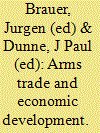

|
|
|
|
|
| Publication |
London, Routledge, 2004.
|
| Description |
xiv, 326p.Hardbound
|
| Standard Number |
0415331064
|
|
|
|
|
|
|
|
|
|
|
|
Copies: C:1/I:0,R:0,Q:0
Circulation
| Accession# | Call# | Current Location | Status | Policy | Location |
| 051329 | 382.456234/BRA 051329 | Main | On Shelf | General | |
|
|
|
|
| 2 |
ID:
083242


|
|
|
|
|
| Publication |
2008.
|
| Summary/Abstract |
This paper considers the interpretation of the empirical results of the developing literature on the demand for military spending that specifies a general model with arms race and spill-over effects and estimates it on cross-section and panel data. It questions whether it is meaningful to talk of an 'arms race' in panel data or cross-section data, and suggests that it may be more appropriate to talk about the relevant variables - aggregate military spending of the 'Security Web' (i.e. all neighbours and other security-influencing powers) and the aggregate military spending of 'Potential Enemies' - as acting as proxies for threat perceptions, which will reflect both hostility and capability.
|
|
|
|
|
|
|
|
|
|
|
|
|
|
|
|
| 3 |
ID:
129826


|
|
|
|
|
| Publication |
2014.
|
| Summary/Abstract |
Egypt plays a pivotal role in the security of the Middle East as the doorway to Europe and its military expenditure reflects its involvement in the machinations of such an unstable region, showing considerable variation over the last 40?years. These characteristics make it a particularly interesting case study of the determinants of military spending. This paper specifies and estimates an econometric model of the Egyptian demand for military spending, taking into account important strategic and political factors. Both economic and strategic factors are found to play a role in determining military burden/spending, with clear positive effects of lagged military burden, suggesting some sort of institutional inertia, plus negative output and net exports effects. The strategic effect as a result of the impact of Israel's military burden is mostly positive and significant, though its impact is reduced when the impact of important strategic events are taken into account. The military spending of Egypt's allies Jordan and Syria generally seems to have had no effect on Egypt's spending. These results are consistent over a range of econometric techniques.
|
|
|
|
|
|
|
|
|
|
|
|
|
|
|
|
| 4 |
ID:
153086


|
|
|
|
|
| Summary/Abstract |
The effects of military spending has on the economy continues to be a subject of considerable debate, with a lack of consensus in the literature. This paper takes advantage of the Stockholm International Peace Research Institute extended data-set to contribute to the debate using empirical methods made available, or more applicable, by the extra observations. It constructs a large panel of countries for the period 1970–2014 to explore the long-run equilibrium relationship between military spending and economic growth, applies the more flexible pooled mean group estimator, and compares the results with the more restrictive dynamic fixed effect method used in earlier influential studies. It also compares results from different time and country samples. Across the specifications it finds a significant and persistent negative effect of military burden on economic growth that is robust across different country groups, with the largest impact being for OECD countries.
|
|
|
|
|
|
|
|
|
|
|
|
|
|
|
|
| 5 |
ID:
050370


|
|
|
| 6 |
ID:
050374


|
|
|
| 7 |
ID:
100955
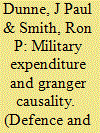

|
|
|
|
|
| Publication |
2010.
|
| Summary/Abstract |
A large literature has used tests for Granger (1969) non-causality, GNC, to examine the interaction of military spending with the economy. Such tests answer a specific although quite limited question: can one reject the null hypothesis that one variable does not help predict another? If one can reject, there is said to be Granger causality, GC. Although the limitations of GNC tests are well known, they are often not emphasised in the applied literature and so may be forgotten. This paper considers the econometric and methodological issues involved and illustrates them with data for the US and other countries. There are three main issues. First, the tests may not be informative about the substantive issue, the interaction of military expenditure and the economy, since Granger causality does not correspond to the usual notion of economic causality. To determine the relationship of the two notions of causality requires an identified structural model. Second, the tests are very sensitive to specification. GNC testing is usually done in the context of a vector autoregression, VAR, and the test results are sensitive to the variables and deterministic terms included in the VAR, lag length, sample or observation window used, treatment of integration and cointegration and level of significance. Statistical criteria may not be very informative about these choices. Third, since the parameters are not structural, the test results may not be stable over different time periods or different countries.
|
|
|
|
|
|
|
|
|
|
|
|
|
|
|
|
| 8 |
ID:
174610
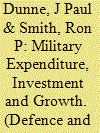

|
|
|
|
|
| Summary/Abstract |
This paper considers the issues involved in estimating the effect of military expenditure on growth and the reasons for the lack of consensus in the literature. It briefly reviews the economic theory, emphasising the difficult identification issues involved in determining the interaction between military expenditure and output and discusses econometric methods for panels. It then takes advantage of the extended SIPRI military spending to construct a relatively large balanced panel of countries for the period 1960–2014. Rather than the usual focus on the direct relation between military spending on growth, it focusses upon the investment channel. It provides estimates of various models examining the interaction between the three variables and finds that the data do not suggest any strong relations between military expenditure and either investment or growth. This is not unexpected given the theoretical and econometric problems identified.
|
|
|
|
|
|
|
|
|
|
|
|
|
|
|
|
| 9 |
ID:
189399
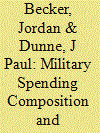

|
|
|
|
|
| Summary/Abstract |
In the large literature on military spending and growth, the heterogeneity of the categories of expenditure is seldom considered. Military spending is used to pay for a variety of things, including salaries, large weapon systems, and physical infrastructure, along with ongoing operations, training, and readiness - each of which might be expected to have different implications for economic growth. One reason for the focus on aggregate spending is the lack of disaggregated cross-country data, but there are some data available from NATO and the EU that break military spending into personnel, equipment, infrastructure and other expenditures (primarily operations and maintenance). This paper uses these data, available for 34 countries, for as many as 49 years, to investigate whether the composition of military budgets affects economic growth. Estimating standard growth models with this data it finds that as expected there is considerable heterogeneity in the effects of the different components. Specifically, the negative correlation between military spending and growth found in recent studies is primarily driven by personnel expenditures, and - slightly less clearly - by operating expenditures.
|
|
|
|
|
|
|
|
|
|
|
|
|
|
|
|
| 10 |
ID:
166742
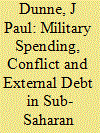

|
|
|
|
|
| Summary/Abstract |
The damaging economic effects of the debt crises on Africa in the late 1980s encouraged considerable research on the determinants of external debt in developing economies. Although sub-Saharan Africa's (SSA) debt was cut by two-thirds by 2008, through two debt relief programmes, debt in the region has since been rising at an increasingly rapid pace. This study provides an empirical analysis of the determinants of external debt in SSA over the period 1960–2016, using dynamic panel methods. It also considers two potentially important factors that have received relatively little attention. One is military spending, rarely considered, despite a number of well-publicised scandals over the procurement of unnecessary and expensive high-tech weapons systems. A second, is the possibility that the countries studied have been involved in conflict. The empirical results point to a positive impact of military spending on external debt, but with some evidence of heterogeneity across the countries. Furthermore, findings indicate that the positive effect of military expenditure on debt becomes more marked in countries that have been affected by conflict. These results imply that policies to improve security and reduce military spending could be beneficial in reducing external debt and, potentially, improving economic performance in the region.
|
|
|
|
|
|
|
|
|
|
|
|
|
|
|
|
| 11 |
ID:
172144


|
|
|
|
|
| Summary/Abstract |
This paper contributes to the analysis of the impact of military spending and corruption on economic growth, by considering not only the political dimension of corruption, distorting the allocation of resources to sectors, but also the impact on the efficiency of the bureaucratic environment. It does this by developing the model of Mauro (2004) in the context of an endogenous growth model to deal with corruption in the defence sector. It then uses data from the International Country Risk Guide to produce a novel measure of corruption that combines corruption within the political system, institutional strength, quality of bureaucracy and the degree of military participation in the country and estimates the model for a large panel of countries. The results suggest that both military spending (as a share of total government spending) and corruption have significant negative long run effects on output. As the model also suggests that multiple equilibria can exist, a comparison is made between high and low corruption groups of countries and clear differences are indeed found. This suggests that effort is needed to encourage and coerce high corruption and military spending countries, but low corruption and military spending countries are likely to need little attention.
|
|
|
|
|
|
|
|
|
|
|
|
|
|
|
|
| 12 |
ID:
069855
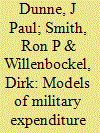

|
|
|
| 13 |
ID:
075717


|
|
|
|
|
|
|
|